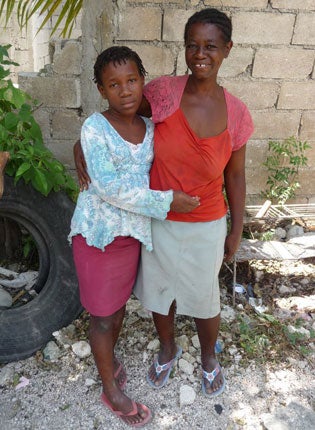The last time Ibola Samedi had hugged her 12-year-old daughter Lovely was after school on Tuesday, 12 January. A few minutes later, the earth began to shake. In seconds, Ms Samedi saw her house, in the Delmas district of Port-au-Prince, collapse.
Terrified, she grabbed her daughter Stephanie, 10, and sons Levinson and Dickensley, four and one, and ran to a patch of nearby wasteland. Half an hour later, Ms Samedi returned to the pile of concrete and twisted metal that lay on the site of her former dwelling. Digging with her bare hands, she found the body of Widler, her seven-year-old son, beneath the rubble. Lovely, the fifth of her children, was unaccounted for.
Until last week, that is. On 4 July, Ms Samedi was telephoned by Etienne Guerline, a local case-worker with the International Rescue Committee (IRC), an aid agency attempting to reunite children believed to have been orphaned in the earthquake with their friends or families. "Do you know a girl called Lovely?" Ms Guerline asked.
"Yes," replied Ms Samedi, who in late January had moved to Les Cayes, in south-west Haiti, to rebuild her shattered life. "She was my eldest daughter, but now she is dead." Ms Guerline took a deep breath. "Maybe you are mistaken."
By Wednesday, Lovely was back in the arms of the mother she had not seen for six months. "I just hugged her and just started to cry out 'My baby! My baby!'," Ms Samedi recalls. "We both cried and held each other for a long time. It was truly a miracle."
The story of how this family came to be reunited illustrates the painstaking nature of the work required to rebuild Haiti. It also underlines how, even after six months, overseas adoption should not be considered the only source of hope for Haiti's orphans.
We now know that a policeman had discovered Lovely, a day after the earthquake, roaming the streets of Port-au-Prince several miles from her home.
She was disorientated, traumatised and in a state of shock, unable to say anything except her first name, so he took her to the Refuge des Orphelins, an orphanage in nearby Martissant.
In June, Ms Guerline visited that home and added Lovely's name to a database which the IRC and other agencies have created to ease the process of reconnecting missing children with their parents. She returned six times, building trust and probing for information that might allow her to track down any old connections. "We did not have much to go on, because Lovely did not remember even her own surname, let alone her phone number or address," Ms Guerline recalls. "But she eventually told us some details: that she once lived in Delmas and that her old school uniform was pink and white." Encouraged, Ms Guerline showed photographs of Lovely to locals. After several fruitless hours, a man who was fixing a car flipped through the pictures, shaking his head, before stopping at one. He stopped and smiled. "I know that girl!"
Ms Samedi was eventually taken to Lovely's orphanage, after convincing the IRC that she was the child's mother, picking her photograph out of a line-up of similar girls and volunteering verifiable information, such as the number of brothers and sisters she had, and the colour of that school uniform.
"I am so grateful for what Etienne did. Really, it has changed both of our lives," she says. Reuniting families is a labour-intensive process. There are 2,511 children on the database, of which 424 have so far been reunited with parents. Their ability to add more is limited by a shortage of funds for new caseworkers, who cost £115 a week to train and employ.
"Stories like this show that, even after six months, there are still thousands of mothers and children out there who we can help with old-fashioned detective work," said a spokesman. "We are reuniting more every week. But we need more money and many more caseworkers. Even now, six months on, this is still a race against time."
Subscribe to Independent Premium to bookmark this article
Want to bookmark your favourite articles and stories to read or reference later? Start your Independent Premium subscription today.


Join our commenting forum
Join thought-provoking conversations, follow other Independent readers and see their replies